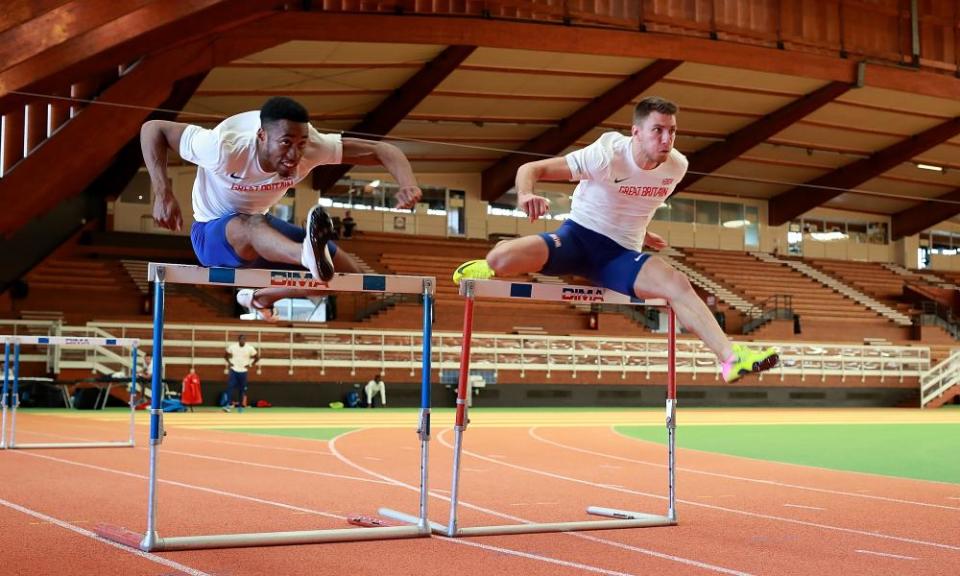David Omoregie draws on family loss to go for win at world championships

David Omoregie could have spiralled into despair after his father and sister died within weeks of each other in 2011. But instead he used the double tragedy to spur his athletics career and will draw on the loss again at the London world championships.
The 21-year-old, one of Great Britain’s brightest young stars, is making his senior debut in the 110m hurdles, an event he points out is famously unpredictable. The aim is to come away with a medal and his mum and three of his siblings will be in the stadium to watch, but when he settles into the blocks his mind will focus on absent family members.
“Given what happened to my dad and sister it was a very difficult time for me,” he says. “Even my athletics wasn’t going well at the time. It just seemed that everything was going wrong. But from that moment on it has given me so much drive and motivation to achieve what I want to do in the sport and I have started to be successful. Even now that is my core value and motivation, just to make them proud.”
Omoregie was studying for his GCSEs in April 2011 when sister Esohe, a junior doctor, was killed in a head-on collision with a drunk driver while travelling home from a late shift at a hospital in Kent. His family got the call the following morning at home in Haverfordwest. His dad, George, also a doctor, had been suffering with terminal cancer since 2008 but the devastating news seemed to send him into a decline and he died one month later. But George’s work ethic is what Omoregie credits with helping him hold the family together in the most testing times. He even left school with five A*s and six As in his GCSEs.
“My dad came to Haverfordwest in 2006 to work at the hospital nearby and we followed him a year later,” says Omoregie, “but eventually he had to stop working because he was so sick. What my dad put into me was the core values. He was a very hard working person. He tried to do everything the best. He put us into good schools and did everything for us.
“When my sister died it was the first time I have seen my mum cry; she is a tough person. In my family there is a younger generation – me, my younger brother and sister – then an older generation. I was only 16 but I was the oldest guy back home and almost had to be the man of the house. If I didn’t, then potentially the others could go off the rails. You see it in some families. But we have done well, I am so proud of my family. My little sister, Sarah, just won silver in the Commonwealth Youth Games in the shot put. It is very easy to fall to pieces but we have done what we can.”
Another motivating factor for Omoregie is missing out on the Rio Olympics. He ran inside the required qualifying time, agonisingly five days after the selection cut-off date. Later in the season he achieved a personal best of 13.24sec, a time which would have been good enough for bronze in Rio.
“It was a bit of a bittersweet moment coming just too late, particularly as it wasn’t even that fast to make the final in Rio,” he says. “I think missing out meant I became very focused and wanted to finish off my season strongly and I think that’s why I did a PB. Coming into this year it’s given me a lot of confidence, I’ve been able to get in a lot of races and compete with the best in my event and I’ve beaten them as well.”
Since 2015 Omoregie has lived in Loughborough, working with a Swedish coach, Benke Blomkvist, and a high-calibre training group including his fellow 110m hurdler Andrew Pozzi, one of the best in the world this year. But he insists there is no bitter domestic rivalry at play.
“Andrew’s a really funny guy,” he says, “In my group we’ve also got Danny Talbot, Harry Aikines-Aryeetey, Dai Greene and we all get on really well. We all want each other to do really well but at the same time we’re looking for excellence ourselves.
“We race each other in training and that’s one of the advantages of training with another hurdler and other sprinters as well, the fact that you can actually practise that pressure situation with people coming up on your inside lane.”
Although Omoregie has not been quite reaching the times he managed last year, he rightly points out that it is an unpredictable discipline and a medal would not be beyond him in the final. The favourite for gold, though, is the USA’s Omar McLeod, who has five of the seven fastest times in the world this year.
“You look at what it takes to make the final at a major championships and the time varies from 13.4 to 13.2 despite world rankings,” he says. “In hurdles anything can happen. I sacrificed the under-23s to be here and there’s definitely the opportunity to make the final. But if not, I’m still very young, many more championships will come and this is a learning experience.”
Whatever the result, Omoregie knows that he is well equipped to cope with any adversity thrown his way.

 Yahoo Sport
Yahoo Sport 





































